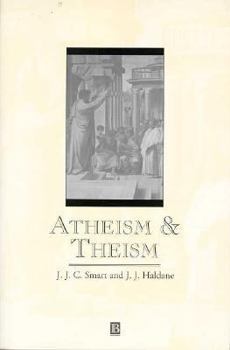Atheism and Theism
Select Format
Select Condition 
Book Overview
The debate between atheism and theism spreads far across the range of philosphical questions about the status of science, the nature of mind, the character of good and evil, the epistemology of experience and testimony, and so on. In this book two philosophers each committed to unambiguous versions of belief and disbelief, debate the central issues of atheism and theism.
Format:Paperback
Language:English
ISBN:0631192921
ISBN13:9780631192923
Release Date:November 1996
Publisher:Wiley-Blackwell
Length:240 Pages
Weight:1.10 lbs.
Dimensions:0.7" x 6.0" x 9.0"
Customer Reviews
4 ratings
A good introduction to the issues
Published by Thriftbooks.com User , 21 years ago
This is a good introduction to many of the main arguments concerning theism and atheism. Smart and Haldane manage to cover most of the main issues while at the same time making original contributions to the debate. The book is especially helpful for giving clear account of the issues surrounding the "fine-tuning" argument due e.g., to Richard Swinburne.As they mention in the Introduction, neither Smart nor Haldane is a specialist precisely in philosophy of religion--both are well known especially for contributions to philosophy of mind--and this affects the book's overall approach. Smart begins with a defense of physicalism (the view that only objects whose existence is required by physical theory exist), arguing that this position should be accepted on the methodological ground that it is most compatible with the results of modern science. Smart also responds to various theistic arguments and defends a version of the "problem of evil" objection to theism. Haldane follows this with a series of arguments against materialist reductionism, taking the failure of reductionism to entail some kind of design and so theism. Haldane also defends versions of the cosmological ("firt cause") argument and attempts a solution to the problem of evil. Smart then briefly responds to Haldane and Haldane to Smart. For Smart, atheism is part of a general commitment to physicalism, whereas Haldane seems no less interested in defending a general antireductionism (e.g., with respect to intentionality) than in defending theism specifically.The book covers a great deal of ground and offers much food for thought. The downside to this is discussions of particular issues are sometimes sketchier than one would like. Perhaps it would have been more effective to focus the book more tightly on the aspect of the debate that raises issues of reductionism vs. antireductionism. I also wish the book had been organized so as encourage a more extended response from Smart to Haldane's antireductionist arguments. Smart's methodological principles may well establish a presumption against theism, but surely this presumption is defeasible, and Haldane's contribution is effect an attempt to defeat precisely this presumption.
Most intelligent debate on existence of god so far
Published by Thriftbooks.com User , 22 years ago
This is the way atheism vs. theism debates should always be. First, Smart and Haldane are very respectful of one another, as well they should be. Second, they are not afraid to delve deep into the true complexities of philosophy of religion, and are both equal to the task. This debate is very unlike typical debates, in which scholarship is subordinated to rhetoric, and readers are likely to come away having learned something about how truly difficult philosophy of religion is.
Debating at its best.
Published by Thriftbooks.com User , 25 years ago
Thorough and respectable debate. In-depth with little rhetoric
Overcoming the phallic
Published by Thriftbooks.com User , 26 years ago
Students of modern thought recognize my headline as one of this centuries philosophical imperatives: "overcoming the phallic" means transcending the logic of opposites, the logic of "Us and Them" that bears a good deal of responsibility for this century's fascist and Stalinist holocausts--as well as similar holocausts of past centuries. This book accomplishes a transcendence of the "Us and Them" pattern by presenting philosophers who respect each other enough to resist ad hominem argumentation and avoid (for the most part) the pitfalls of discussing this emotionally-charged topic. A final warning: both of these thinkers are "Metaphysical Realists" (they contend that common ground here makes their discussion possible and fruitful). This means they believe in, and reason from, a world existing independent of human knowledge thereof. Readers who do not accept this will gain little from their arguments.






